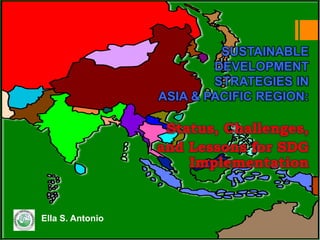07 asian nsds asef_e.antonio_21_nov12
- 1. SUSTAINABLE DEVELOPMENT STRATEGIES IN ASIA & PACIFIC REGION: Status, Challenges, and Lessons for SDG Implementation Ella S. Antonio
- 2. Strategy formulation in Asia & Pacific has reached some level of maturity SD Plan/Strategy Country Majority NSDS (Long-Term) (No info: North Korea, SIDS) Poverty Reduction Strategy Almost all developing and poor Paper countries Socio-Economic; Environment & Almost all. Similar Plan (Medium-Term) Specialized Plans (CC; GG; GE) Many Sector plans All
- 3. But the NSDS formulation and implementation remain extremely challenged ? The SD concept and its operationalization are still not quite understood and implemented ? Conventional development strategy is no longer compatible with emerging realities; inter-linkages (e.g. among energy, food and financial markets) must be given more attention ? Perspectives and strategies for long term sustainability are compromised by short-term priorities and sidelined during crises. Short- or medium-term plans are preferred ? Leadership changes & international agreements tend to redirect strategies or produce new ones (e.g. GG/GE; CC)
- 4. Challenges ? Implementation is hampered by lack of ownership and support due to weaknesses in the formulation process, e.g.: ? Some were produced only for compliance or use of available external funding ? Lacks participation. ? Enabling or support mechanisms are generally not in place: ?Investment program; Budget support (not normally linked to budgeting); Legislative agenda, Research Agenda; M&E system, etc.
- 5. Challenges ? Coherence, integration and internal consistency remain weak horizontally and vertically ? The tendency to formulate strategies for each pillar/dimension remains strong ? Regional, sub-regional, national & local strategies are disconnected & do not inform each other. Existing strategies have limited coordination and consistency ? Appropriate/Working institutional mechanisms are generally not in place ? A communication program for formulation and implementation is not given attention ? An M&E system with appropriate indicators & assessment methodology is sometimes not in place
- 6. Points to Ponder 1. With all the challenges it faces, how prepared is AsPac for the development and pursuit of SDGs? 2. Does AsPac have what it takes to develop and pursue SDGs? 3. What does AsPac need to respond to the SDG challenge?
- 7. ? Pillars: ? good governance ? sustainable socio-economic ? One Index development ? 33 indicators ? cultural preservation ? environmental conservation Psychologica l Wellbeing ? Life satisfaction ? Positive Living emotions Health Standards ? Negative ? Mental health emotions ? Assets ? Self reported ? Spirituality health status ? Housing ? Household per ? Healthy days capita income ? Disability Gross Ecological Diversity and Resilience Time Use GNH ? Ecological Issues ? Environmental ? Work responsibility ? Sleep National ? Wildlife damage ? Urbanization issues Community Vitality Education Happiness ? Donations (time & money) ? Community relationship Good Cultural ? Literacy ? Schooling ? Knowledge ? Value ? Family ? Safety Governance Diversity and ? Govt Resilience performance ? Speak native ? Fundamental Language rights ? Cultural ? Services Participation Center for Bhutan Studies ? Political ? Artistic Skills Participation ? Driglam Namzha
- 8. China Agenda 21 China¨s Circular ? Goals: Economy ? national economic development ? Goal: Green consumption ? increased social productivity and production ? enhanced overall national ? Resource efficiency strength ? Less GHG ? improved quality of life ? Minimized waste esa.un.org
- 9. SD Strategies of Republic of Korea National SD Strategy Green Growth Strategy ? Goal: Secure National SD ? Goal: A Global Green Leader Capability Commensurate ? Strategies with G20 Status ? Climate Change Response ? Strategies ? Reduce GHG; Energy ? Adaptation to Climate Change independence; Adapt to CC and Response Mechanism ? New Growth Engines ? Improve sustainability of ? Develop green technology; Green economic & industrial the industry sector; Advance structure industrial structure; Establish foundation for GG ? Promote social equity and public health ? Quality of Life ? Enhance sustainability of ENR ? Green space & transportation; Green revolution in life; Global ? Indicators: 77 model on GG
- 10. Thailand ? Eradication of Poverty ? Ensuring competitiveness of economy ? Improving social development ? Ensuring good governance ? Ensuring clean and health environment
- 11. National Philippine Agenda 21 ? A viable and vibrant economy that SD Goals significantly reduces poverty & inequality ? A social system that develops self-reliance ? Abundant, healthy and well-managed Papua archipelagic ecosystem ? Responsive, accountable and responsive New Guinea government ? Integral Human Development ? Equality and Vietnam NSDS Goal Participation ? Industrialized country by 2020 ? National Sovereignty and self reliance GG Goal ? NR and the ? Green growth and low carbon economy environment mainstream of sustainable economic development and strengthen social economic development.
- 12. Responses to Questions 1. AsPac readiness to develop, adopt and pursue SDGs varies widely among countries. Prepared countries are a minority 2. Only some AsPac countries have what it takes to develop and pursue SDGs ? Countries are very clear about their goals but have limited capability to attain them ? A few have defined and adapted SD to their aspirations and culture and contributed to the global body of knowledge ? Many introduced innovations, shifted towards thematic (integrated) strategy formulation, and develop indicators and measurement systems
- 13. Responses to Questions 3. Following are proposed to be undertaken to help AsPac face the SDG challenge: ? Carefully understand the NSDS formulation and implementation situation, strengths and weaknesses ? Reformulate/Recalibrate/Fine-Tune NSDS taking into account lessons from precedng bullet ? Harmonize goals and strategies ? Reform the institutional framework at the national level and complement this with reforms in other levels.
- 14. Thank You. ^if the Government cannot create happiness for its people, then there is no purpose for government to exist. ̄ Bhutan Legal Code of 1629














